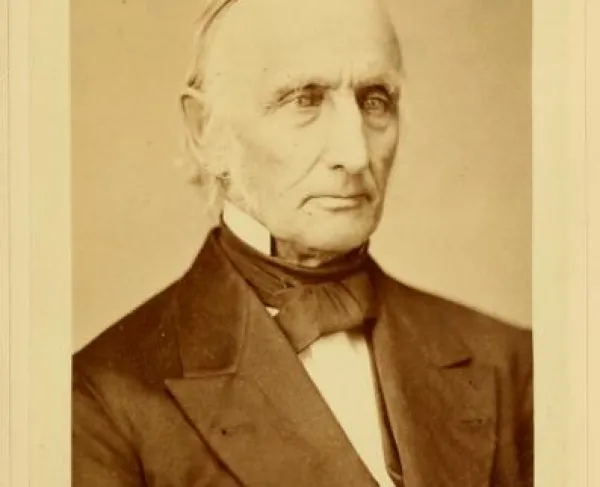Samuel Simon Schmucker

Samuel Simon Schmucker was born in Hagerstown, Maryland, on February 28, 1799. Fourteen years earlier in 1785, his father, John George Schmucker had emigrated from Germany to the United States. John George and his first wife, Catherine Gross, had three children, Samuel being the older brother of two sisters. When Samuel was ten, John George moved the family to York, Pennsylvania, for his work as a minister. Samuel attended York Academy and, after a brief hiatus studying at the University of Pennsylvania, eventually taught there. However, in 1817, Samuel Schmucker embarked on a mission trip to Kentucky; it was this experience that inspired him to follow in his father’s footsteps and become a (Lutheran) pastor.
Schmucker joined the Princeton Theological Seminary and became a pastor in 1820. Though newly ordained, he had numerous aspirations he quickly set out to achieve. He hoped to:
- Create an English translation of Lutheran theology;
- Found a seminary and a college;
- Create a “general synod” of the Lutheran Church to unite the smaller communities.
Schmucker achieved one of these goals rapidly, founding the General Synod of the Lutheran Church in 1820. That same year, he moved to New Market, Virginia to answer his first ministerial call. During his tenure in Virginia, he married and lost his wife, Eleanora Geiger, to childbirth, and he married again. His second wife, Mary Catherine Steenbergen, came from a wealthy slave-owning family. Schmucker would also outlive Steenbergen, who passed away in 1848. Around 1849, he would marry Esther Minor. Most of his thirteen children came from his second marriage with Steenbergen.
After one year of marriage, Samuel and Mary moved to Gettysburg, Pennsylvania, in 1826 to pursue one of his other aspirations – opening a seminary. Lutheran Theological Seminary fulfilled Schmucker’s goal of creating an educated Lutheran ministry for the German population in middle Pennsylvania. Schmucker led the seminary and taught there for nearly four decades. As he was educating future pastors, he identified the need for a college in the area, leading to the establishment of Pennsylvania College (now Gettysburg College) in 1832.
Though occupied with the Seminary and College, Schmucker dedicated time to writing. He wrote countless sermons and published four books. His work, Elements of Popular Theology (1834), highlighted his views on the institution of slavery. Schmucker was a moderate abolitionist; he believed in the gradual emancipation of enslaved people and advocated for the freedmen’s relocation to Africa. He wrote:
Himself a native of a slave state, and for many years resident among slaves, the writer is convinced that those who advocate entire, immediate abolition, do not understand the subject…The work, in justice to the master, and in mercy to the slave, must be gradual; but its commencement ought to be delayed no longer.
As time wore on, Schmucker’s support for abolition became more fervent and outspoken. The basement in his own home and at the Seminary were used as stops in the Underground Railroad. The American Civil War began in 1861, and by the summer of 1863, Confederate and Union armies neared the Lutheran Theological Seminary. Schmucker was advised to flee the town before the Confederate Army could arrest him. The fighting began on July 1, 1863, just west of the town of Gettysburg. As Lee’s Army of Northern Virginia attacked, the Union troops on the left-hand side fought a losing battle and retreated to Seminary Ridge. For a short time, it was a strong defensive position where the Union Army made a final stand before withdrawing through Gettysburg to Cemetery Hill. The Confederate Army raided Schmucker’s home toward the end of the first day of the battle. Lee utilized Seminary Ridge as the center of operations throughout the rest of the battle. The Seminary would become a field hospital for wounded Union troops and then a general hospital for both armies.
Schmucker returned to Gettysburg following the conclusion of the battle eager to get the wounded soldiers out and ready the torn-up building for the fall 1863 semester. Peter Miele, Public Historian and former President of the Seminary Ridge Museum and Education Center, believed that Schmucker and the Seminary viewed their place in the battle as “a distraction and an inconvenience to the seminary’s main mission of training…students for the Lutheran faith.” However, Samuel did serve on the committee that initiated the process of buying battlefield land that would eventually become Gettysburg Park.
Schmucker retired in 1864 and turned his focus towards writing. Nevertheless, he left a legacy with his founding of the Lutheran Theological Seminary; it is the longest operating seminary in the United States. Schmucker died in Gettysburg on July 26, 1873, at the age of 74 years old. He was buried in Evergreen Cemetery in Gettysburg.
We're on the verge of a moment that will define the future of battlefield preservation. With your help, we can save over 1,000 acres of critical Civil...
Related Battles
23,049
28,063





